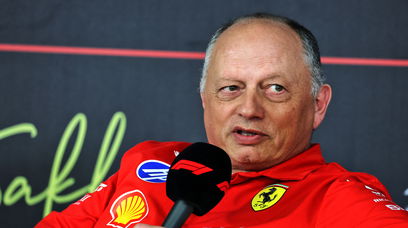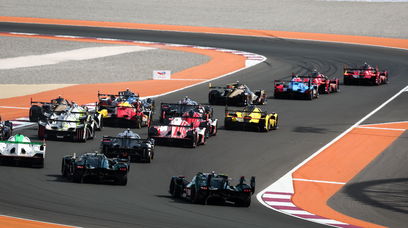Jolyon Palmer has questioned why the stewards decided not to penalise Max Verstappen for his stern defence against Lewis Hamilton at the Brazilian Grand Prix, arguing that it was a "clear case" of forcing a rival off the track. Verstappen and Hamilton battled for the lead at Turn 4 in the closing stages of last weekend's race at Interlagos, with Verstappen running deep and both drivers taking to the escape area on the exit. While the stewards noted the incident, they ultimately decided not to pursue it any further. Hamilton went on to pass Verstappen several laps later, before cruising to victory, a development that Palmer reckons left the stewards "breathing a sigh of relief". With missing footage from Verstappen's onboard camera emerging after the race, Mercedes are seeking a stewards' review ahead of this weekend's Qatar Grand Prix, with a meeting set to take place at 17:00 local time (14:00 UK time) on Thursday.
"I'm dubious about the decision"
Assessing the incident in his column for Formula1.com , former F1 driver Palmer wrote: "Verstappen made his intentions very clear that he would do everything possible to stop Hamilton passing him, with his contentious defensive move. "I absolutely understand why Verstappen did what he did, but was it a legitimate defensive move? Was it just good, hard racing or was it a step too far? "I'm dubious about the decision. For me, it raises questions about precedents for racing in the future - and from a sporting point of view, it didn't make sense to me. "I'm sure that this was an immensely tough decision for the stewards to make, given everything at stake with their decision here, and the weight of the outcome hanging over them. But for me, it was a clear case of forcing another driver off track."
Will it change the way drivers race?
Palmer is concerned that a lack of action from the stewards over Verstappen's defence might set a dangerous precedent going forward. "Had Verstappen managed to at least stay on the track himself then I think we would be in the grey area seen so many times already this year; is it hard defence and the driver on the outside has to back off, or is it squeezing another driver off the road?" Palmer asked. "If Verstappen had stayed on track, I think the former could be argued, and that is what has been the case in almost all circumstances this year. "But the fact that Verstappen was so late on the brakes, from a tight angle, meant he also had to run off the road by multiple car widths. That denied Hamilton the chance to stay on track. "If this sort of defensive manoeuvre is now acceptable, how can we expect another move to be completed around the outside, so long as there is the ever more popular asphalt run-off?" Verstappen and Hamilton arrive in Qatar separated by just 14 points in the championship standings.
Most read






